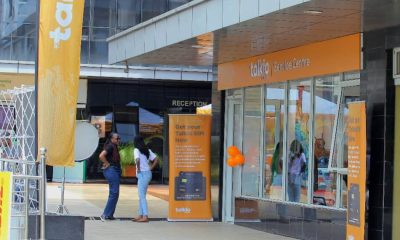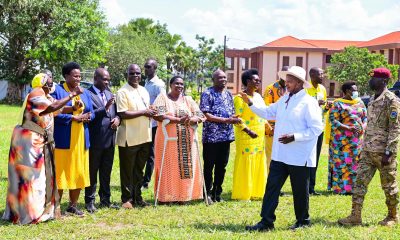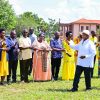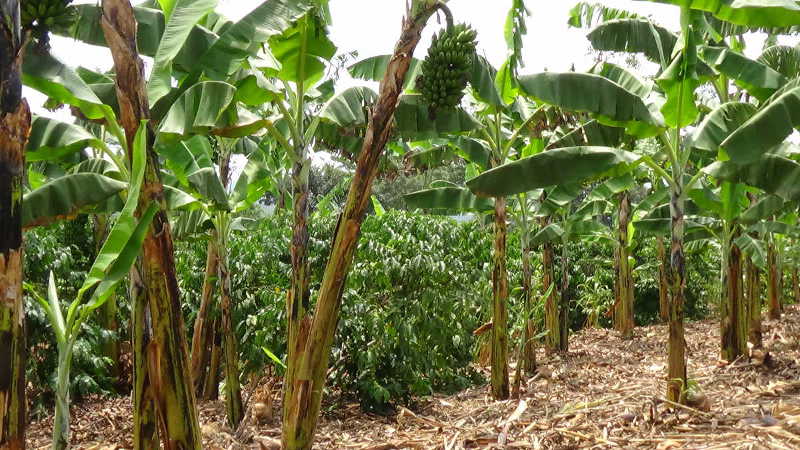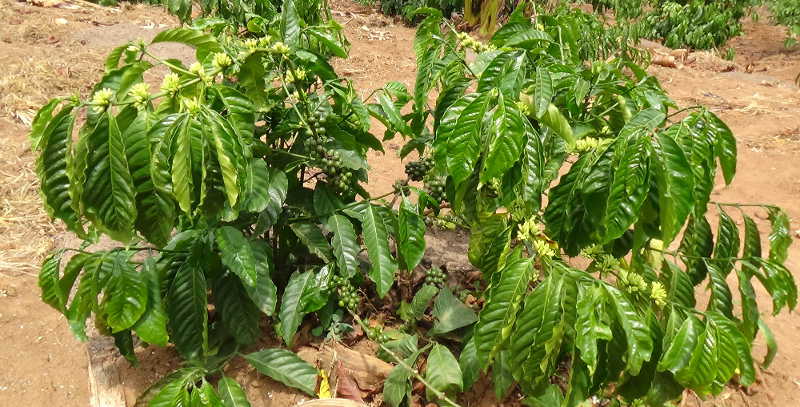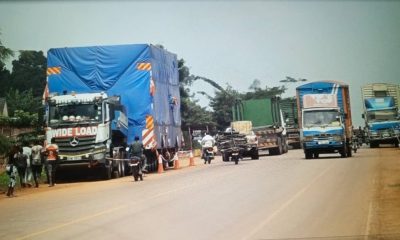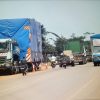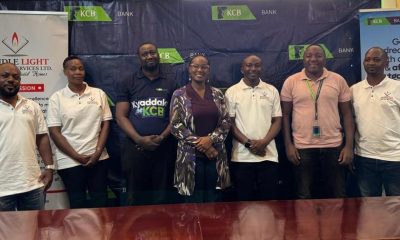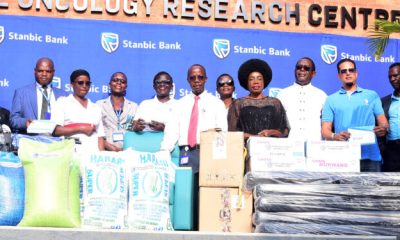Business
Superior seeds, better farming practices make Lwanga a millionaire
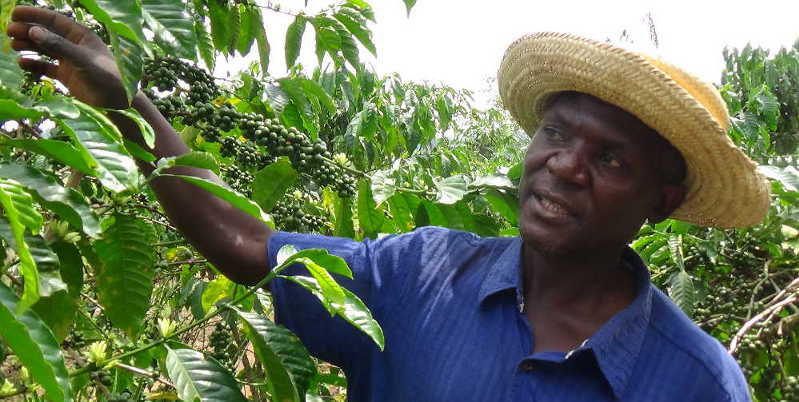
Ugandan Coffee Farmer Charles Lwanga prides in the power of quality seeds. He is confident about a better future
Luxuriant coffee trees laid out as if on a mathematical grid ushers you to Charles Lwanga’s home in Manja parish, Kisekka sub-county Lwengo district. Mixed with the coffee is an equally lush and manicured banana plantation boasting several bunches of Matooke as proof of success.
Lwanga’s name is almost synonymous with success in modern agriculture across the sub-county and perhaps the entire district of Lwengo.
His ten-acre garden stands out in stark contrast with his neighbours’, mulching, fertiliser use and proper spacing.
Like most Ugandans, Lwanga grew up in a farming background growing coffee, bananas and several cereals. A trip to one farmer in nearby Masaka district who had planted improved clonal coffee, changed his mindset.
The farmer’s coffee crops looked healthier, had more beans and looked more promising than most other shambas Lwanga had ever come across. He recalls that he was tipped by the owner to seek higher yielding varieties and learn better husbandry practices from agricultural experts in a nearby agricultural training centre.
He went to Kamennyamiggo District Agricultural Training and Information centre in Lwengo to acquire new skills in agriculture. A week of interaction with the experts proved to be the turning point for Lwanga.
“That is when I knew that good quality seeds are extremely important in any agricultural venture,” says Lwanga: “But these must be accompanied by good husbandry to give good results.”
Coming back home, he started to implement what he’d learned, starting with coffee, beans and maize. He later added a few lines of bananas in his coffee.
“There is a wrong mentality among many farmers that buying seeds erodes farmers’ incomes as opposed to saving seed. This mentality deprives farmers of the value of high quality seeds whose benefits in terms of yield as well as resistance to diseases tends to be greater than conventional varieties,” says Lwanga.
Lwanga derives his conclusion from his experience in planting improved seeds both for coffee and cereals gathered over the past five years.
“I bought my initial clonal coffee cuttings from Kamenyamiggo and at Nvubu in Rakai district. I also bought a kilo of K132 bean seeds from which I harvested 100 kilograms at the end of the season. My experience in growing beans showed me that this K132 type of beans yields almost twenty times higher than conventional varieties for which you need about a 20-kg tin to get one 100 bag of beans.”
With coffee, he says: “I planted clonal coffee popularly known as Nalongo or ‘D’ whose yield is much higher than conventional varieties.” The variety perhaps got its name from its characteristic of bearing beans for two seasons on the same stalk.
Unlike other coffee varieties, Lwanga says that Nalongo flowers after only about one and half years after planting and a single plant can yield about ten kilos of unprocessed dried beans every year, nearly double the yield of ordinary coffee.
Better harvesting and drying has brought Lwanga added value to the price of his coffee by ensuring that he supplies better quality coffee.
“If harvested and dried well, Nalongo gives you higher screen quality that attracks higher pay by the exporters.
For example, last season i sold my coffee at Ushs5000 a killo of Kase (processed) coffee, while the average price was about Ushs4400 per kilo.”
“The moment it gets rain, it flowers,” says Lwanga. More importantly perhaps is that Nalongo is resistant to the devastating Coffee Wilt Disease which destroyed nearly 50 percent of Uganda’s coffee plantations during the past two decades.
Lwanga made further inquiry into the various investment options in his locality and found that growing Nalongo and a few better yielding crops would turn him into a millionaire.
He recalls: “I inquired about some of the attractive investments options in our area and found that coffee growing was the better option. I talked to informed people who told me that the best commercial building in our area cost Ushs80million to put up. They informed me further that the most the owner would get in rent would be around Ushs4m annually.”
He adds: “But if I invested the same amount of money raising a 10-acre coffee shamba, I would be able to harvest 4000 kilos every year and earn Ushs16m annually assuming that I sell a kilo of processed coffee beans at Ushs4000. I knew that I would be able to put up the building in a few years and still keep my coffee garden.”
Since he chose coffee as his business in 2010, Lwanga is confident his dream is gradually being realised and may be surpassed as the shamba matures.
“Currently, I harvest coffee worth about Ushs10 million every year out of 60 bags of coffee. My goal is to hit 200 bags in the next five years,” says Lwanga.
Aside from his coffee sales, Lwanga is using the skills he obtained from Kamenyamiggo to make money from producing and selling clonal coffee cuttings to fellow farmers from within his village and beyond.
Last season, Lwanga made about Ushs10million from selling 10,000 clonal coffee cuttings of the highly demanded Nalongo.
Thanks to Lwanga’s entrepreneurship as well as his willingness to share information with farmers in his village and beyond, he has transformed coffee growing in the area.
More importantly perhaps is that his neighbours are not only happy about adopting his higher yielding varieties, they are uprooting the old types and replacing them with Nalongo despite the anticipated delay caused by the transition.
Those who’ve visited Lwanga’s farm and bought some of his planting materials, such as village mate and renowned farming writer Michael Ssali, praise him for maintaining a clean job but also for opening their eyes to the secrets to making money from coffee.
“This man is my consultant on coffee. He knows so much about coffee and has made a huge contribution towards the adoption of improved coffee in our area,” said Ssali.
Indeed, as yours truly navigated Manja village, the fruits of Lwanga’s skills and training were evident as Nalongo is seen sprouting everywhere like an invasive species. More importantly perhaps, is that coffee growing is beginning to transform the lives of the people of Manja as seen from improved houses.
Comments





